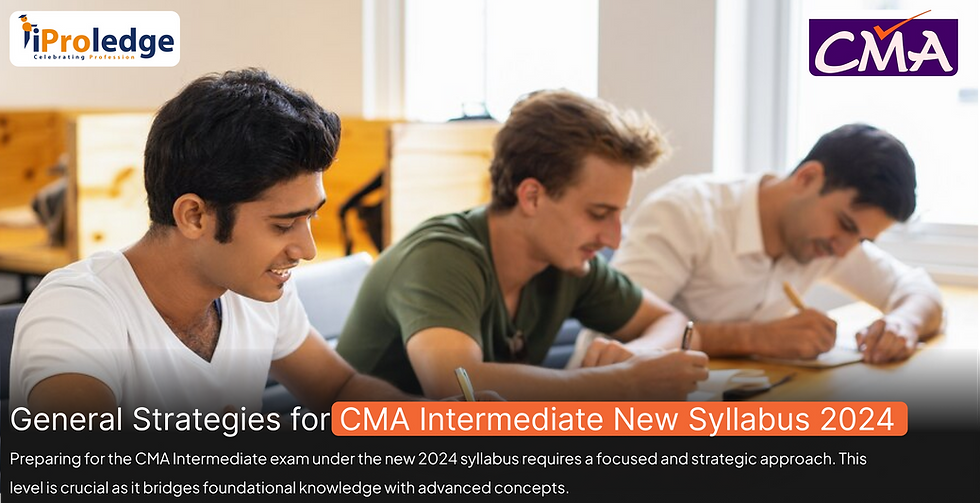General Strategies for CMA Intermediate New Syllabus 2024
- varshiniveerendra
- Jul 22, 2024
- 6 min read

Preparing for the CMA Intermediate exam under the new 2024 syllabus requires a focused and strategic approach. This level is crucial as it bridges foundational knowledge with advanced concepts. To excel, students should first thoroughly understand the revised syllabus and its structure. Effective time management is key, with a study plan that allocates specific time for each subject. Utilizing quality study materials, practicing with past exam papers, and taking regular mock tests will help in understanding the exam pattern and improving problem-solving speed. Additionally, seeking guidance from experienced mentors and joining study groups can provide valuable insights and support throughout the preparation journey.
What is CMA Intermediate?
CMA Intermediate is the second level in the Cost and Management Accountancy (CMA) certification program, designed to deepen a candidate's understanding of cost accounting, management accounting, and related financial management practices. This level builds on foundational knowledge from the CMA Foundation and introduces more complex concepts and applications. The curriculum covers subjects such as Financial Accounting, Laws and Ethics, Operations Management, and Strategic Management, among others. Successfully passing the CMA Intermediate exam is essential for progressing to the final level of the CMA program, which ultimately leads to certification as a Cost and Management Accountant, a credential highly regarded in the fields of finance and business strategy. Learn CMA Intermediate Syllabus 2024
General Strategies
Understand the Syllabus: Familiarize yourself with the new syllabus and exam structure. Break down each subject to know what topics are covered.
Create a Study Plan: Develop a realistic and structured study schedule. Allocate specific time slots for each subject and stick to the plan.
Use Quality Study Materials: Choose reliable and comprehensive study materials. Refer to ICMAI study materials, recommended textbooks, and supplementary resources.
Regular Practice: Solve past exam papers and take regular mock tests to get a feel of the exam pattern and to improve time management.
Conceptual Clarity: Focus on understanding concepts rather than rote learning. Clear your doubts immediately to avoid confusion later.
Join Coaching or Study Groups: Enroll in a coaching class or join study groups to get guidance and support from peers and mentors.
Revise Regularly: Make revision a continuous process. Regularly revisit topics to reinforce your understanding and retention.
Stay Updated: Keep yourself updated with any changes or updates in the syllabus or exam pattern announced by ICMAI.
Time Management: Practice efficient time management both while studying and during the exam to ensure all topics are covered and questions are answered.
Stay Healthy: Maintain a balanced diet, exercise regularly, and get enough sleep to keep your mind and body fit for studying.
General Strategies for CMA Intermediate New Syllabus 2024
Financial Accounting Paper 5
Focus on understanding accounting standards and their applications.
Practice journal entries, ledger postings, and preparation of financial statements regularly.
Laws and Ethics Paper 6
Memorize key legal provisions, especially those related to corporate laws and ethics.
Use case studies to understand the practical application of laws and ethical principles.
Direct Taxation Paper 7
Stay updated with the latest tax amendments and finance acts.
Solve practical problems on income computation, tax liabilities, and returns filing.
Cost Accounting Paper 8
Master various costing methods and techniques such as marginal costing, standard costing, and budgetary control.
Practice cost sheet preparation and variance analysis.
Operations Management & Strategic Management Paper 9
Understand concepts of operations management, production planning, and control.
Study strategic management models and their implementation in business scenarios.
Cost & Management Accounting and Financial Management Paper 10
Integrate your knowledge of cost accounting with financial management principles.
Focus on financial statement analysis, working capital management, and capital budgeting.
Indirect Taxation Paper 11
Get a strong grasp of GST and customs laws.
Regularly solve practical problems related to tax calculations and compliance.
Company Accounts & Audit Paper 12
Study company accounts, amalgamations, and reconstructions thoroughly.
Understand auditing standards and procedures, and practice audit report drafting.
Regular Revision
Make a habit of revisiting each subject periodically to reinforce your understanding.
Use summary notes and flashcards for quick revisions.
Mock Tests and Past Papers
Take regular mock tests to assess your preparation and improve time management.
Analyze past papers to understand the exam pattern and frequently asked questions.
Subject-specific Strategies for CMA Intermediate New Syllabus 2024
Financial Accounting (Paper 5) - 20% Weightage
Key Focus: Accounting standards, preparation of financial statements, and solving practical problems.
Strategy: Regular practice of journal entries, ledger postings, and financial statements. Study and understand each accounting standard thoroughly.
Laws and Ethics (Paper 6) - 10% Weightage
Key Focus: Corporate laws, ethics, and case studies.
Strategy: Memorize key legal provisions and ethical principles. Use case studies to understand practical applications.
Direct Taxation (Paper 7) - 15% Weightage
Key Focus: Income tax laws, computation of income, and tax liabilities.
Strategy: Stay updated with the latest amendments, solve practical problems, and practice tax returns filing.
Cost Accounting (Paper 8) - 15% Weightage
Key Focus: Costing methods, techniques, and cost sheet preparation.
Strategy: Master marginal costing, standard costing, and variance analysis through regular practice.
Operations Management & Strategic Management (Paper 9) - 10% Weightage
Key Focus: Production planning, control, and strategic management models.
Strategy: Understand concepts thoroughly and apply strategic management models to business scenarios.
Cost & Management Accounting and Financial Management (Paper 10) - 20% Weightage
Key Focus: Integration of cost accounting and financial management principles.
Strategy: Focus on financial statement analysis, working capital management, and capital budgeting. Practice regularly.
Indirect Taxation (Paper 11) - 10% Weightage
Key Focus: GST, customs laws, and practical tax calculations.
Strategy: Understand the GST framework, solve practical problems, and keep up with legal updates.
Company Accounts & Audit (Paper 12) - 20% Weightage
Key Focus: Company accounts, amalgamations, reconstructions, and auditing standards.
Strategy: Study company accounts thoroughly, understand auditing procedures, and practice drafting audit reports.
Additional Tips
Regular Revision: Make a habit of revisiting each subject periodically.
Mock Tests: Take regular mock tests to assess your preparation and improve time management.
Study Groups: Join study groups for discussion and better understanding.
Use Quality Materials: Refer to ICMAI study materials and recommended textbooks for in-depth study.
These strategies, combined with consistent effort and practice, will help in mastering the CMA Intermediate syllabus and performing well in the exams.
Conclusion
Successfully passing the CMA Intermediate exam requires a well-structured study plan, understanding each subject's key focus areas, and regular practice. By staying updated with the latest amendments, utilizing quality study materials, and taking mock tests, you can confidently tackle the new syllabus. Remember, consistency and dedication are key to excelling in this important step towards becoming a certified Cost and Management Accountant.
FAQs
What is the CMA (Cost and Management Accountancy) certification?
The CMA certification is offered by the Institute of Cost Accountants of India (ICMAI) and signifies expertise in cost accounting, management accounting, financial management, and strategic management. It is highly regarded in the finance and business sectors.
How do I become a CMA in India?
To become a CMA in India, one needs to pass three levels of exams: Foundation, Intermediate, and Final, conducted by ICMAI. After passing these exams and completing practical training, one can apply for CMA certification.
What are the career opportunities for CMAs in India?
CMAs in India have diverse career opportunities in industries such as manufacturing, banking, consulting, IT, and government sectors. They can work as cost accountants, financial analysts, management consultants, or in senior managerial roles.
What is the syllabus for the CMA Intermediate exam?
The CMA Intermediate exam syllabus covers subjects like Financial Accounting, Laws and Ethics, Cost Accounting, Operations Management, Financial Management, Taxation, Strategic Management, and Company Accounts & Audit.
How long does it take to complete the CMA certification?
The time to complete the CMA certification depends on individual study pace and exam schedules. On average, candidates take about 3-4 years to clear all three levels (Foundation, Intermediate, and Final) and fulfill the practical training requirements.
What is the pass percentage for the CMA exams?
The pass percentage for CMA exams varies each year and across different levels. Generally, candidates must score a minimum of 40% marks in each paper and an aggregate of 50% marks to pass each level of the exam.





Comments